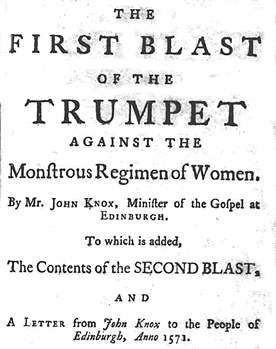A disparaging description, often used to describe feminist or rowdy women by their detractors.
Monstrous regiment of women
What's the meaning of the phrase 'Monstrous regiment of women'?
What's the origin of the phrase 'Monstrous regiment of women'?
The phrase came into being following the publishing of a diatribe, titled The First Blast of the Trumpet Against the Monstruous Regimen of Women. in a pamphlet in 1588 by Scottish Protestant reformer John Knox. ‘Monstruous’ is an archaic spelling of ‘monstrous’, by which Knox meant ‘unnatural; deviating from natural order’, rather than the more common ‘like a monster’ meaning that we now use.
The other word in the pamphlet’s title that is now routinely spelled differently to the original is ‘regimen’. This is more significant as ‘regimen’ and ‘regiment’ are now understood to mean different things. We now usually use the word ‘regiment’ to mean an organised body of troops. What Knox was railing against was not ranks of marching women but female ‘regimen’, that is, rule or regulation by women.
Although Knox didn’t intend it, ‘regiment’ isn’t so far from the truth. The context of the reformer’s outburst was the twoing and froing of the British crown’s allegiances to Catholicism and Protestantism that began under Henry VIII. Following the death of Henry’s young protestant son Edward VI in 1553, there was no legitimate male heir to the English throne and three queens succeeded him – Jane Grey (Protestant), Mary I (Catholic) and Elizabeth I (Protestant). In addition, in 1543 in Scotland, the infant Mary Queen of Scots, under the regency of her Catholic mother Mary of Guise, came to the throne. This was all too much for the patriarchal and rabidly protestant Knox. For him, the ‘unnatural’ ceding of power to a bunch of mere women was bad enough, but having both monarchies in the hands of Catholic women was unendurable.
In the meantime, the expression ‘the monstrous regiment of women’ has been fertile ground for creative works under the broad heading of ‘the battle of the sexes’. A British feminist theatre group adopted it as their ironic name in 1975 and there have been several eponymous novels, several of them comic, by Clemence Dane, Thomas Berger, Storm Constantine, Laurie King and Terry Pratchett.
Knox, not a fun-loving guy by all accounts, would not have been amused. His original intention in coining the phrase is now mostly forgotten. Perhaps if we altered the phrase from ‘monstrous regiment of women’ to ‘unnatural regime of Marys’, we would be nearer to Knox’s original meaning.
The history of “Monstrous regiment of women” in printed materials
Trend of monstrous regiment of women in printed material over time
Browse more Phrases
About the Author

Phrases & Meanings
A-Z
A B C D E F G H I J K L M N O P Q R S T UV W XYZ
Categories
American Animals Australian Bible Body Colour Conflict Death Devil Dogs Emotions Euphemism Family Fashion Food French Horses ‘Jack’ Luck Money Military Music Names Nature Nautical Numbers Politics Religion Shakespeare Stupidity Entertainment Weather Women Work
How did we do?
Have you spotted something that needs updated on this page? We review all feedback we receive to ensure that we provide the most accurate and up to date information on phrases.
